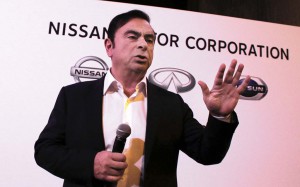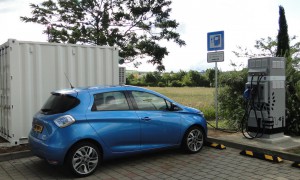French automaker Renault, a pioneer in the drive to electrify, now wants hybrids, plug-ins and pure battery-electric vehicles to account for half of its global sales by 2022.
The carmaker is echoing the strategy of its Japanese alliance partner Nissan, which also sees a future increasingly dependent upon electric propulsion systems like the one used in its Leaf model, the world’s best-selling all-electric automobile. More broadly, some of the industry’s largest manufacturers, including General Motors and Volkswagen, as well as smaller and niche players such as Volvo, Mercedes-Benz and even Aston Martin, have in recent weeks announced similar plans to shift to electric propulsion.
“We are confident we can turn upcoming … challenges into significant business opportunities,” said Carlos Ghosn, CEO of Renault, who also serves as chief executive of the Renault-Nissan Alliance.
The push by both of the Alliance’s partners, as well as the third leg of the stool, Mitsubishi, is significant in terms of the overall industry push to electrify. Together, the Alliance is now the best-selling auto group in the world, this year surging past rivals Volkswagen and Toyota.
(GM to add two new BEVs over 18 months, eventually go all-electric. Click Here for the story.)
Renault itself expects a significant bump in sales in the coming half-decade, Ghosn setting a target of 5 million vehicles in 2022, up from 3.2 million last year. That means that electrified models alone would generate nearly as much volume five years from now as Renault sold using all forms of propulsion in 2016.

Carlos Ghosn, Renault CEO, is pushing the brand's hard move toward electrification of its product portfolio.
There are plenty of skeptics who question the push to battery power. They note that sales last year, including everything from conventional hybrids to BEVs, accounted for barely 3% of total global new vehicle volume. But demand has started to gain traction in 2017 and the pace is now expected to accelerate – for several reasons.
(Honda joins growing list of makers pushing into electrification. Click Here for the story.)
First, there are the increasingly stringent government mileage and emissions mandates going into effect around the world. Several countries, including Norway and India, have formally laid out plans to ban internal combustion vehicles entirely, with France, Germany, China and the UK among those considering similar moves.
Of course, there’s also the question of consumer acceptance, which has so far been marginal. But electrified vehicles are increasing their appeal due to improvements in powertrain technology. The latest models are quicker, more fun to drive and, in many cases, offer substantially longer range. Prices are also coming down. Both Tesla and General Motors now offer models – the Model 3 and Chevrolet Bolt, respectively – that can run more than 200 miles per charge yet cost a little more than $30,000 after factoring in federal and state incentives.
There are still obstacles, notably charging times. But new forms of advanced batteries are expected to reach market early in the coming decade. Toyota is hinting it will turn to solid-state batteries, a significant advancement over today’s lithium-ion technology, when it launches a new line-up of BEVs in 2021. They are expected to be cheaper, longer-range and may cut charging times down to minutes, rather than hours, making vehicles using the new batteries more competitive with conventional internal combustion vehicles.
Like Nissan, Renault was one of the first automakers to mass produce an electric vehicle, and its line currently includes the little Twizzy model. It also inends to add more the end of the decade and ramp up quickly over its five-year plan.
What is unclear is whether Renault will offer battery-based options on some or all of its product lines. Some makers, including Volvo, will only offer electrified drivelines, whether hybrid, plug-in or pure battery-electric. GM, which says it will have 20 BEVs in market by 2023, plans to migrate entirely to pure electric power – though it has not announced a formal timetable.
Renault’s shift to electric comes weeks after the French maker and its Alliance partners revealed plans to bring the individual makers even closer together in a bid to share more common platforms and components and slash overall costs. Ghosn also intends to have the Renault-Nissan Alliance invest heavily in the development of autonomous vehicle technology as well as completely driverless robo-taxis.
(For more on the Renault-Nissan Alliance plans, Click Here.)

